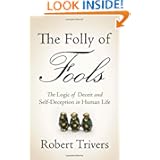In “Nudge thyself” (Financial Times, November 18, 2011), a of Robert Trivers’ Deceit and Self-Deception Steven Cave allows us to know that “Economists have more to learn from the natural sciences if they are to claim a realistic model of human behaviour.” We make irrational choices, it seems. But do we?
The book is vast in scope, covering every aspect of our lives from sex to religion, family to war. But Trivers reserves particular ire for the failings of economic theory: it “acts like a science and quacks like one” he writes, but it is not one. Its key ideas are naive and circular: it assumes we make our choices as rational utility maximisers, for example. And what is utility? It is whatever we, in fact, choose. There is no room in such a theory for me to plan to buy a salad, then persuade myself when faced with the cheeseburger that it is the superior option (“just this once”) only to regret it later. “Yet,” he rages, “such is the detachment of this ‘science’ from reality that these contradictions arouse notice only when the entire world is hurtling into an economic depression based on corporate greed wedded to false economic theory.”
Steady on. How did we decide that choosing fast food rather than health food is irrational? Forget the evolutionary psychology mumbo-jumbo about our alleged carnivore ancestors, who supposedly rule our desires today. Forget even the considerable evidence that the ancient human diet was varied, as we might reasonably expect. Let’s just focus on the proposition itself for a moment:
If Double Fries With That honestly believes that this life is all there is and that – before he ceases to exist – he would rather by happy in the present moment than down the road, is that irrational? Why?
Of course, he might become a problem to others down the road if he gets sick, but that doesn’t make his choice irrational, rather selfish. Others might refuse to look after him, in the end – and he might just accept that, for the right to live as he pleases.
Back of Trivers’ “rage” is a moral preference for self-discipline and prudence over self-indulgence and living for now. But Trivers has no basis for that morality; it is merely a preference he wishes to impose on a heedless world. Absent a transcendent frame of reference, his rage is mere prejudice against people who don’t choose to live the way he wants.
One need hardly point out that a transcendent frame of reference is not equivalent to God. It could be the ancient Greek or Chinese philosophers’ “good life” or “way of the gentleman.” It is a value beyond this life, one to which Double Fries With That is urged to aspire because it is intrinsically better for a man than burying his face in grease and starch. To this conception of life, evolutionary psychology can add nothing but petulant demands for conformity without vision.
While Cave’s review is generally laudatory, he acknowledges evolutionary psychology’s defects:
Trivers would like to see economics rebuilt on new foundations: those of evolutionary biology. But many of his specific claims are far from solid. They suffer from the broader weakness of his discipline: that claims about the evolutionary usefulness of this or that trait are notoriously difficult to test and relatively little is known with certainty about our prehistoric past. Some of Trivers’ theories, therefore, go far beyond the evidence – such as his claim that the rate at which new religions emerge is a function of the number of diseases in a given area. Perhaps Trivers, a grand old man of his field, can indulge himself in such speculations, safe in the knowledge that a generation of graduate students will earn their spurs trying to fill in the gaps.
Alternatively, they will learn why he rages so.
Follow UD News at Twitter!
